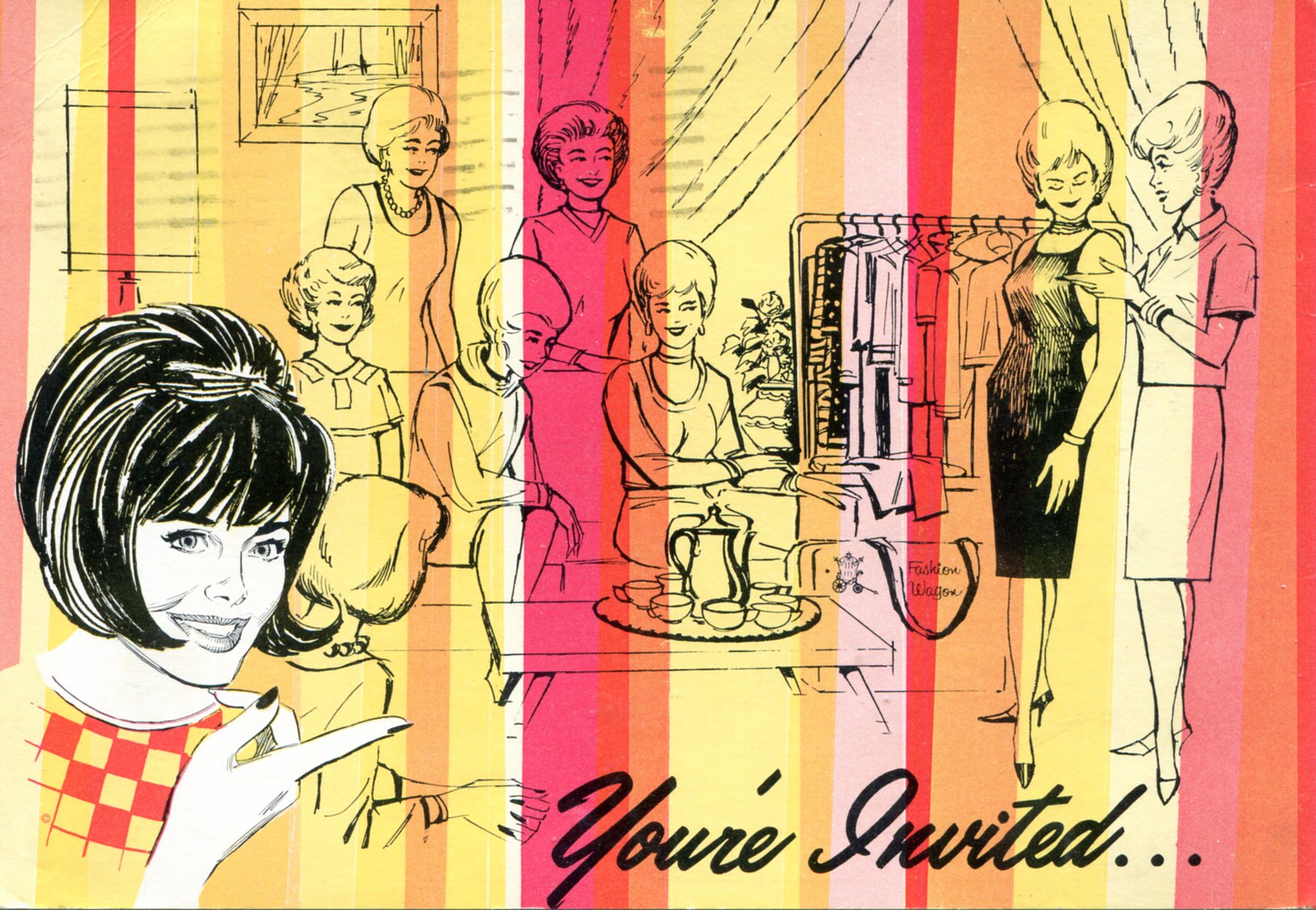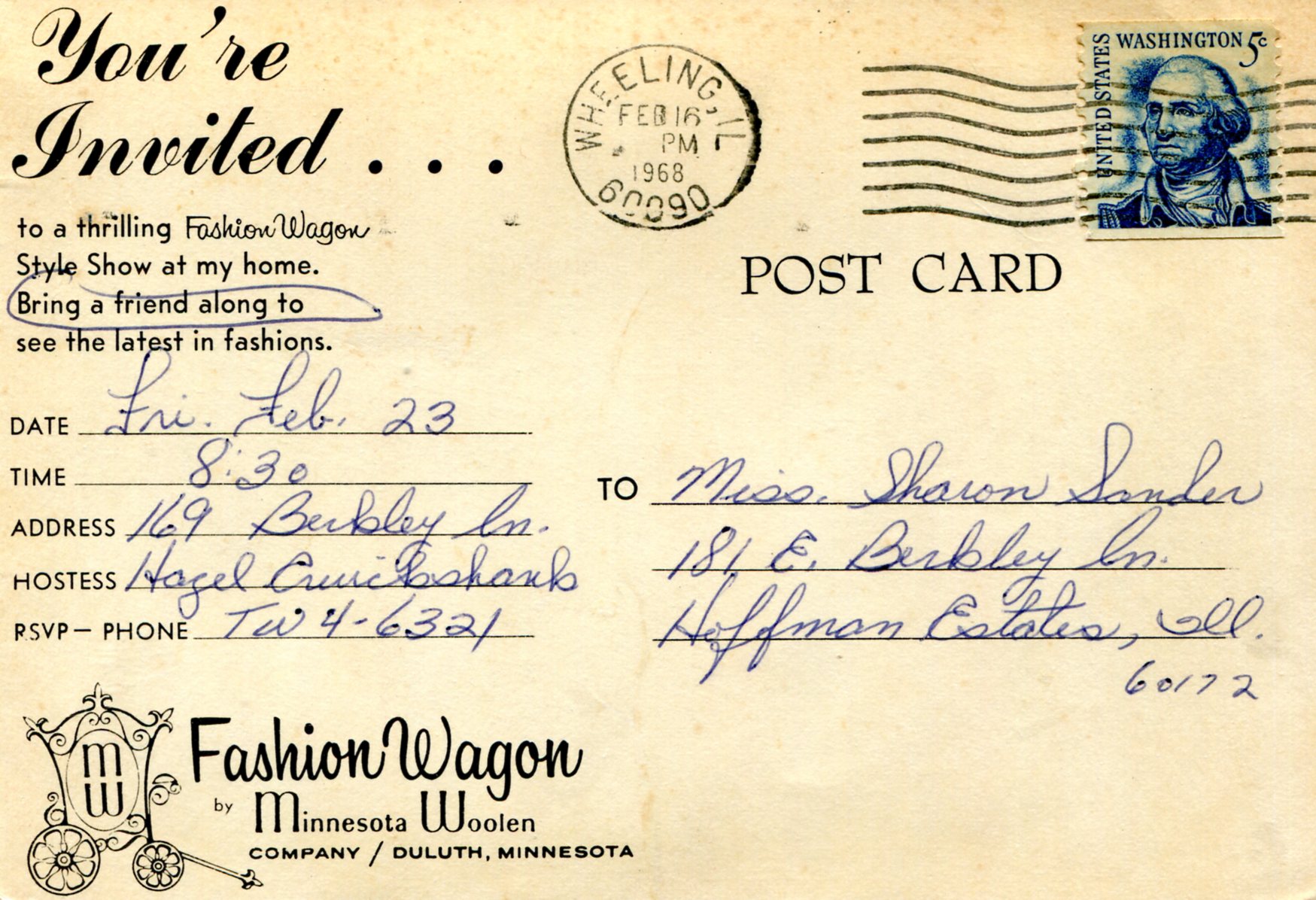One more recently acquired postcard for the week. This one’s in James Lileks territory, I think, not only because of the mid-century commercial artwork, but also because the entity behind it was from Minnesota.
 If that card doesn’t scream late ’60s, I don’t know what does. Indeed, it’s postmarked February 16, 1968. It’s an invitation for a neighbor to a “Fashion Wagon Style Show” at a house in Hoffman Estates, Ill., scheduled for February 23.
If that card doesn’t scream late ’60s, I don’t know what does. Indeed, it’s postmarked February 16, 1968. It’s an invitation for a neighbor to a “Fashion Wagon Style Show” at a house in Hoffman Estates, Ill., scheduled for February 23.
 An event to brighten up what must have been a dreary February in metro Chicago (they’re all dreary). And to sell a few dresses. Interesting detail: the RSVP phone number uses two letters to begin with. That pretty much disappeared in the ’70s, but I remember learning the telephone exchange letters for our home phone number as a child. It began with TA (Taylor).
An event to brighten up what must have been a dreary February in metro Chicago (they’re all dreary). And to sell a few dresses. Interesting detail: the RSVP phone number uses two letters to begin with. That pretty much disappeared in the ’70s, but I remember learning the telephone exchange letters for our home phone number as a child. It began with TA (Taylor).
Apparently TW was “Twinbrook.” That took a little digging to find, but strangely enough I found it referenced in Jack Hoffman’s obit in the Chicago Tribune in 2008. Hoffman was the homebuilder who developed Hoffman Estates.
“Eventually, Mr. Hoffman’s company would build some 5,000 homes in the town incorporated in 1959 as Hoffman Estates. Residents that year voted to name the new city Twinbrook, after the local telephone exchange,” the paper noted. “But Mr. Hoffman’s influence led the homeowners association’s board of directors to dismiss the popular vote.”
So much for the vox populi, but there’s still a Twinbrook Elementary School in the village. Note that the editor didn’t see fit to explain the term “telephone exchange” in 2008. Few readers younger than me would understand the reference, but then again, how many people younger than me read newspapers?
Back to the card: it was produced by the Minnesota Woolen Co. to promote its fashion parties. A little digging and you find information from the University of Minnesota Duluth that tells you that “the Minnesota Woolen Company was founded in Duluth in 1916 by Nat G. and Abraham B. Polinsky. The company sold clothing throughout the United States through door-to-door sales. The company was the largest in the nation in sales of clothing on a direct to consumer basis…
“The Mendenhall, Graham Company was purchased in 1946 by Minnesota Woolen Company, which operated it as Minnesota Manufacturing Company with a plant at 514 West 1st Street. The company distributed clothing designed and manufactured in part at 131 West 1st Street through the national Fashion Wagon Party Plan introduced in 1962….
The last major expansion occurred in 1972 when the company moved the Fashion Wagon sample warehouse and shipping facility into a new building at 42nd Avenue West and Superior Street. The retail store closed in 1976, the manufacturing outlet in 1977.”
By the time alphanumeric telephone exchanges were gone, so were Fashion Wagon Parties.
(Speaking of telephones, out of idle curiosity I looked up those two dates in 1968, and found, according to Wiki anyway, that “…on February 16, 1968, the first-ever 9-1-1 call was placed by Alabama Speaker of the House Rankin Fite, from Haleyville City Hall, to U.S. Rep. Tom Bevill, at the city’s police station.”)